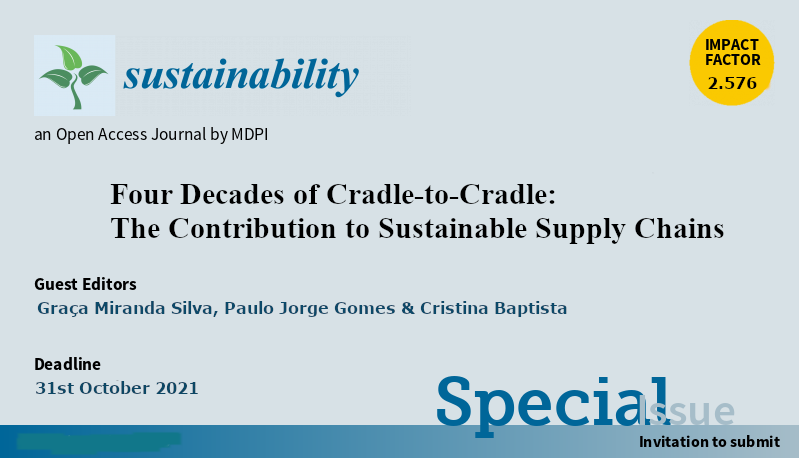
The guest editors Graça Miranda Silva, Paulo Jorge Gomes and Cristina Baptista are inviting for submission to the Special Issue “Four Decades of Cradle-to-Cradle: The Contribution to Sustainable Supply Chains”, with deadline up to 31st October of 2021.
Sustainability is an international, interdisciplinary, academic, peer-reviewed and open-access journal on environmental, cultural, economic and social sustainability, with an impact factor of 2.576, indexed on the Science Citation Index Expanded, Social Sciences Citation Index (Web of Science platforms) ) and Scopus.
Presentation:
Sustainability journal is launching a Special Issue to document the contributions of “cradle-to-cradle” (C2C) thinking to sustainable supply chains, celebrating 20 years since the publication of the book popularizing this concept.
The phrase is credited to the work of Walter R. Stahel in the 1970s and was popularized by William McDonough and Michael Braungart in their 2002 book, “Cradle-to-Cradle: Remaking the Way We Make Things”1. A unique feature of C2C is the idea of nutrient metabolisms: all material involved in industrial and commercial processes are either technical or biological nutrients. Everything can be designed to eliminate waste – “waste” from one system becomes food for another, returned safely to the soil as biological nutrients, or re-utilized as high-quality materials for new products. The C2C framework offers the aspiration of enduring benefits for society from safe materials, water and energy in circular economies, a vision well-aligned with the three pillars of sustainability – the economy, environment, and social welfare.
The current understanding of sustainability as a system property2 requires us to view C2C not merely from a technical and product-centric focus, but as a system level challenge to supply chain redesign, requiring not only technological but also social, cultural, institutional, and organizational change.
In the cradle-to-cradle supply chain, products are designed and manufactured from sustainable materials and safely returned to the technical and biological cycles in closed loops. Incorporating the concept within existing supply chains has proved to be challenging. For instance, the importance of return supply chains within the total economic chain is often poorly understood. Embracing the cradle-to-cradle concept requires a significant redesign of the supply chain through innovation3. More studies are needed on the relation between innovation and sustainable supply chain4.
For this Special Issue, we are interested in papers that further our understanding of the supply chain consequences of the “cradle-to-cradle” concept. More specifically, how innovation can address the challenges of cradle-to-cradle in supply chains. We refer to different types of innovation, including product and service innovation, technological innovations, process innovations, administrative, and business model innovations.
We have identified the following domains but are open to other related areas.
- Implementation of closed-loop supply chains increasing effectiveness of the return supply chains, such as the creation and participation in systems to collect and recover the value of materials following their use.
- Emerging technologies supporting the transition from linear model to circular model, such as the ones under the umbrella of Industry 4.0.
- Development of new tools for the industry that assist in the implementation of C2C framework.
- Transformation of supply chains based on replacement of non-renewable resources, for instance, maximizing the use of clean and renewable energy – such as solar, wind, geothermal, gravitational energy, and other energy systems being developed today.
- Design of products and materials with life cycles that are safe for human health and the environment and that can be reused through biological and technical metabolisms, maintaining quality of materials.
- Design of supply chains showing concerns of social responsibility promoting healthy ecosystems and respecting local impacts on social systems.
- Implementation of quality management across the supply based on a holistic understanding of quality, by integrating material health, environmental, and social criteria5, and its relationship with innovation.
- Business model innovation for circular supply chains, such as product as a service model.
- Digital business models that facilitated supply chain circularity, and implementation of sustainability practices across the supply chain that moves organizations towards cradle-to-cradle practices.
- Develop innovation capabilities engaging supply chain actors such as open innovation capabilities aimed at advancing sustainable supply chains.
We encourage both empirical research and analytic models that are grounded in relevant supply chain management problems, in addition to literature reviews. We value diversity both in terms of theoretical bases and empirical approaches, and research based on mixed methods approaches.
References
- McDonough, W., & Braungart, M. (2002). Cradle to Cradle: Remaking the way we make things. North point press.
- Ceschin, F., & Gaziulusoy, I. (2016). Evolution of design for sustainability: From product design to design for system innovations and transitions. Design studies, 47, 118-163.
- Silva, G. M., Gomes, P. J., & Sarkis, J. (2019). The role of innovation in the implementation of green supply chain management practices. Business Strategy and the Environment, 28(5), 819-832.
- Tebaldi, L., Bigliardi, B., & Bottani, E. (2018). Sustainable supply chain and innovation: A review of the recent literature. Sustainability, 10(11), 3946.
- Braungart, M., McDonough, W., & Bollinger, A. (2007). Cradle-to-cradle design: creating healthy emissions—A strategy for eco-effective product and system design. Journal of cleaner production, 15(13-14), 1337-1348.
